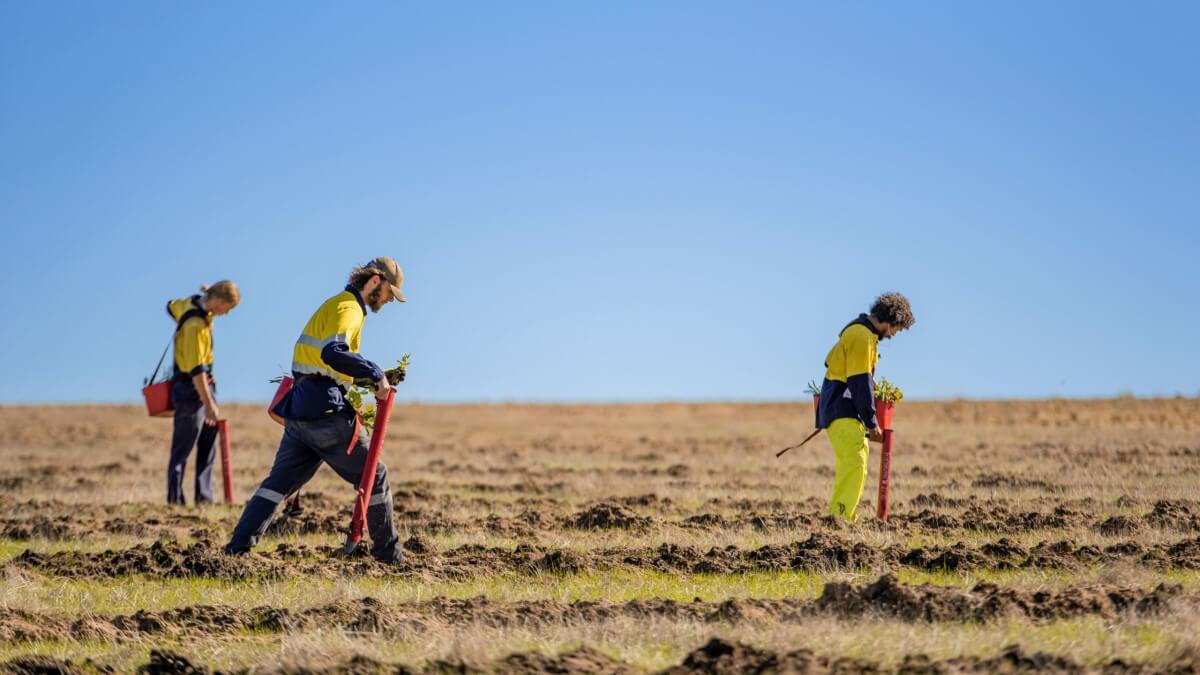Over a million native seedlings planted in WA’s wheatbelt
An indigenous-led carbon farming project north of Perth hopes to encourage greater use of native plants in large-scale revegetation programs to improve biodiversity.
Based in Perth Nativ Carbonewith financial assistance from Woodside, began work on a reforestation project in the Wheatbelt region, which will create jobs for Aboriginal people.
To celebrate the initial planting, a welcome home and smoking ceremony was recently held on Yued Noongar country, with elder Beverley Port Louis.
Nativ Carbon plants 1.2 million native seedlings, covering between 35 and 40 species, on two plots of land near Moora of approximately 2,000 hectares.
The majority of shrubs, ground covers and small trees, germinated last year, will be planted in the coming weeks.
Nativ Carbon director Matthew Oswald says the development employs “a substantial number” of Indigenous people.
“Indigenous employees assisted with seed collection, fence removal, weed control and plant installation with support from Gambara,” he says.
Oswald, along with Yamatji engineer Darren Lundberg, is also the co-founder of Gambara, a majority-owned Aboriginal company specializing in environmental, landscaping, rehabilitation and revegetation work in the civil construction, oil and gas and mining sectors.
“Now, in the installation phase, three new team members – from the local Yued band – will join the project,” says Oswald. “Nativ Carbon aims to consistently provide regional and Indigenous employment opportunities, wherever possible, and we are pleased to have achieved this goal in this project.”
Watch: Rewilding: How to Build a Forest
Approximately 30 people, some based in Wheatbelt, will work on plant installation and surface preparation. In addition, 20 employees were employed to look after the cultivation of the plants over a period of six months at the Plantrite nursery, under contract with Nativ Carbon to produce the plants.
Port Louis ensures that indigenous peoples benefit from projects and industry in their own country.

“We’re tired of looking at the Brand Highway, seeing mining on both sides,” she says. “These companies need to look into Yued’s employment because we are struggling to find jobs for young people.
“As a mother and grandmother, I am mobilizing to create jobs for our young people.
“Moora is a hub for the Noongar…we have over 400 Aboriginal people living in this town and most of our young people are unemployed. »
Port Louis says she and other community leaders are reaching out to mining and other industries.
Plantrite managing director David Lullfitz said the company is working to develop long-term employment opportunities beyond the three-month planting season.
“This includes training and qualifications, including weed control licenses,” he says. “Western Australia is seen globally as a biodiversity hotspot and we encourage federal and state governments to develop incentives or credits for biodiversity as well as carbon.
“Currently, ‘biodiversity’ is defined by clean energy regulator legislation as more than two species and we hope that future large-scale reforestation projects will incorporate a wide range of native plants.
“This will in turn attract a wider range of wildlife and other wildlife.”
A Woodside spokesperson said contributing to the project is part of the company’s plan to achieve net zero emissions by 2050: “These goals are to reduce net greenhouse gas emissions from scopes 1 and 2 by 15% by 2025, by 30% by 2030.”
“We have three ways to achieve these goals: avoid emissions through design, reduce them through efficient operations, and offset the rest.
“Avoiding and reducing emissions are our top priorities.”


Comments are closed.